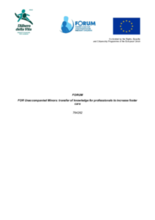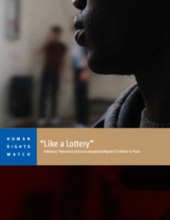Displaying 31 - 40 of 104
This article and accompanying video from Human Rights Watch outlines some of the flaws uncovered in the procedures of age assessment of unaccompanied minors in France’s Alpine region.
In France more than 140 000 children live in foster homes under the responsibility of the French Child Protection Agency. These children have lived in environments that cannot be good for their development and have been separated from their families which have to have consequences on their mental development. A literature review in France and abroad was made to identify the profiles of these children, their risk factors, and the mental disorders they can present.
This book largely focuses on unaccompanied minors who arrived in a European country in 2015, with special attention paid to the top-three nationalities of unaccompanied minors, namely Syrian, Afghan and Eritrean minors.
The present study addressed institutionalised children and staff members' perspectives about bullying in Residential Care settings (RCs) in five European countries (Bulgaria, France, Greece, Italy and Romania.).
This article is written as part of the FORUM project (FOR Unaccompanied Minors: transfer of knowledge for professionals to increase foster care), an EU funded project which sought to enhance the capacity of professionals to provide quality foster care for unaccompanied migrant children, primarily through the transfer of knowledge. The article aims to contribute to this transfer of knowledge by bringing together literature which is of relevance to professionals developing or enhancing foster care services for unaccompanied migrant children.
According to Human Rights Watch, the authorities in Paris "are using summary age assessments to determine eligibility for services" for unaccompanied minors, "in violation of international standards and French regulations," says this article from Eurasia Review.
This chapter describes the child protection system in France.
This report from Human Rights Watch examines the arbitrary procedures and inordinate delays in determining that unaccompanied migrant children in France are under age 18, the first step to entry into the French child protection system.
This paper adopts a life course perspective to explore well‐being amongst youth (18–25 years) who migrated as children to the UK and France.
This study explores how the social workers and the families cope with the paradox of constrained help and enter into some form of collaboration.


